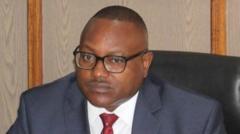Following allegations of systematic drug theft affecting aid to Zambia, the foreign ministry has cautioned diplomats about public commentary, emphasizing the need for proper diplomatic channels.
Zambia Issues Diplomatic Warning Amidst Aid Theft Allegations

Zambia Issues Diplomatic Warning Amidst Aid Theft Allegations
Zambian officials push back against US diplomat's claims regarding systematic theft of medical supplies.
Zambia's foreign ministry has issued a stern warning to diplomats following public statements made by the US ambassador regarding "systematic" theft of donated medical supplies in the southern African country. Foreign Minister Mulambo Haimbe expressed concerns over what he described as an "increasing tendency" among envoys to bypass traditional diplomatic channels, undermining the essential "spirit of mutual respect".
While Haimbe did not explicitly name the ambassador, his remarks were interpreted as a direct response to US envoy Michael Gonzales, who had earlier held a press conference. At that conference, Gonzales announced a reduction in US health aid to Zambia by $50 million due to the theft of vital medications meant for patients, asserting the public route was taken after over 30 unsuccessful meetings with Zambian officials.
In response, Haimbe emphasized that addressing government issues through the media could be seen as a breach of diplomatic norms and assured that Zambia was open to addressing concerns through appropriate channels. Additionally, the US embassy noted that they had presented evidence regarding the corruption to Zambian authorities back in April of the previous year, and offered assistance in rectifying the situation and ensuring justice for victims of the alleged theft.
Recent developments include the completion of a forensic audit related to the alleged theft, which has been submitted to security agencies for further investigation. Home Affairs Minister Jacob Mwiimbu reported that approximately 75 individuals had been arrested during a nationwide crackdown, which included raids on over 400 health facilities involved in the scheme. Mwiimbu assured the public that no one would be exempt from scrutiny in the investigation.
Further complicating matters, Gonzales revealed that an inspection conducted by US officials at over 2,000 pharmacies last year indicated widespread sale of medications and medical supplies donated by the US. In light of these allegations, Zambia’s Health Minister Elijah Muchima pointed out that the problem of theft is not new and precedes the current government, which began its term in 2021.
Muchima confirmed that several officials have been dismissed due to these thefts and that steps have been taken to implement a digital stock tracking system aimed at preventing future discrepancies in the supply of medicines. The anticipated reduction in US funding is expected to impact medications for critical health issues such as malaria, HIV, and tuberculosis. However, the health minister reassured the public that there are currently sufficient supplies available, mitigating any immediate risk of shortages.
The cuts in US assistance are distinct from the freeze on foreign aid implemented by President Donald Trump earlier, which significantly affected health programs across Africa, including the supply of crucial medical materials. In response to those issues, President Hakainde Hichilema of Zambia indicated the necessity for the country to bolster its financial resources to independently procure medical supplies.
According to the US embassy, US contributions account for a significant portion—approximately one-third—of Zambia’s public health spending, highlighting the potential implications of the recent diplomatic tensions.
While Haimbe did not explicitly name the ambassador, his remarks were interpreted as a direct response to US envoy Michael Gonzales, who had earlier held a press conference. At that conference, Gonzales announced a reduction in US health aid to Zambia by $50 million due to the theft of vital medications meant for patients, asserting the public route was taken after over 30 unsuccessful meetings with Zambian officials.
In response, Haimbe emphasized that addressing government issues through the media could be seen as a breach of diplomatic norms and assured that Zambia was open to addressing concerns through appropriate channels. Additionally, the US embassy noted that they had presented evidence regarding the corruption to Zambian authorities back in April of the previous year, and offered assistance in rectifying the situation and ensuring justice for victims of the alleged theft.
Recent developments include the completion of a forensic audit related to the alleged theft, which has been submitted to security agencies for further investigation. Home Affairs Minister Jacob Mwiimbu reported that approximately 75 individuals had been arrested during a nationwide crackdown, which included raids on over 400 health facilities involved in the scheme. Mwiimbu assured the public that no one would be exempt from scrutiny in the investigation.
Further complicating matters, Gonzales revealed that an inspection conducted by US officials at over 2,000 pharmacies last year indicated widespread sale of medications and medical supplies donated by the US. In light of these allegations, Zambia’s Health Minister Elijah Muchima pointed out that the problem of theft is not new and precedes the current government, which began its term in 2021.
Muchima confirmed that several officials have been dismissed due to these thefts and that steps have been taken to implement a digital stock tracking system aimed at preventing future discrepancies in the supply of medicines. The anticipated reduction in US funding is expected to impact medications for critical health issues such as malaria, HIV, and tuberculosis. However, the health minister reassured the public that there are currently sufficient supplies available, mitigating any immediate risk of shortages.
The cuts in US assistance are distinct from the freeze on foreign aid implemented by President Donald Trump earlier, which significantly affected health programs across Africa, including the supply of crucial medical materials. In response to those issues, President Hakainde Hichilema of Zambia indicated the necessity for the country to bolster its financial resources to independently procure medical supplies.
According to the US embassy, US contributions account for a significant portion—approximately one-third—of Zambia’s public health spending, highlighting the potential implications of the recent diplomatic tensions.




















